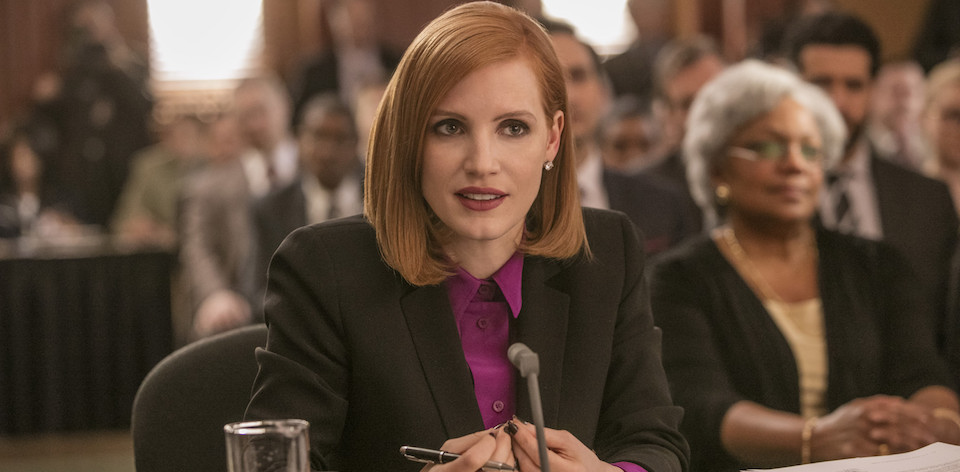The political football of gun control is of the most contentious issues in the United States, thanks to rights enshrined in the Second Amendment. Most entertainment media tends to take a fairly centrist approach to the issue, finding a fictional meeting point where the Venn diagrams meet. MISS SLOANE is partially about the consequences of taking a liberal stance.
In the world D.C. political lobbyists, Elizabeth Sloane (Jessica Chastain) does whatever it takes to win, and her reputation as one of the most formidable combatants is well earned. However, when she decides to switch firms to take a position against the gun lobby, her world and life are threatened in a very real sense.
Much of MISS SLOANE is built around the intense central performance of Chastain, and her “granite wall” of a character has few cracks in it. Before we even know what the film is about, her po-faced character is already set in stone. The few cracks she and the narrative allows us, including her sole human connection in male escort Forde (Jake Lacy), show a life led in the pursuit of winning at the expense of family and friends. “I understand you have feelings and a life,” she tells co-workers, “but I have no duty to them.” Despite being hard to “like” in the traditional sense, throwing colleagues under the bus on a regular basis, the forces against Sloane are set up to make it very easy to root for her plight.
Crafted around an Aaron Sorkin or House of Cards style thriller, Jonathan Perera’s fairly taut script offers a few twists along the way, including Sloane’s ambush of a trusted confidant. However, the consistently ruthless nature of Sloane also makes it easy to telegraph how the final act will play out. Even so, there’s something satisfying about watching a representative of the system find where “the line” falls, even if the issue of gun control ultimately becomes secondary to the personal arc of the eponymous lead.
[stextbox id=”grey” bgcolor=”F2F2F2″ mleft=”5″ mright=”5″ image=”null”]2016 | US | DIR: John Madden | WRITER: Jonathan Perera | CAST:Jessica Chastain, Mark Strong, Gugu Mbatha-Raw, Michael Stuhlbarg, Alison Pill, Jake Lacy, John Lithgow, Sam Waterston | DISTRIBUTOR: Roadshow Films | RUNNING TIME: 132 minutes | RELEASE DATE: 2 March 2017 (AUS)[/stextbox]






